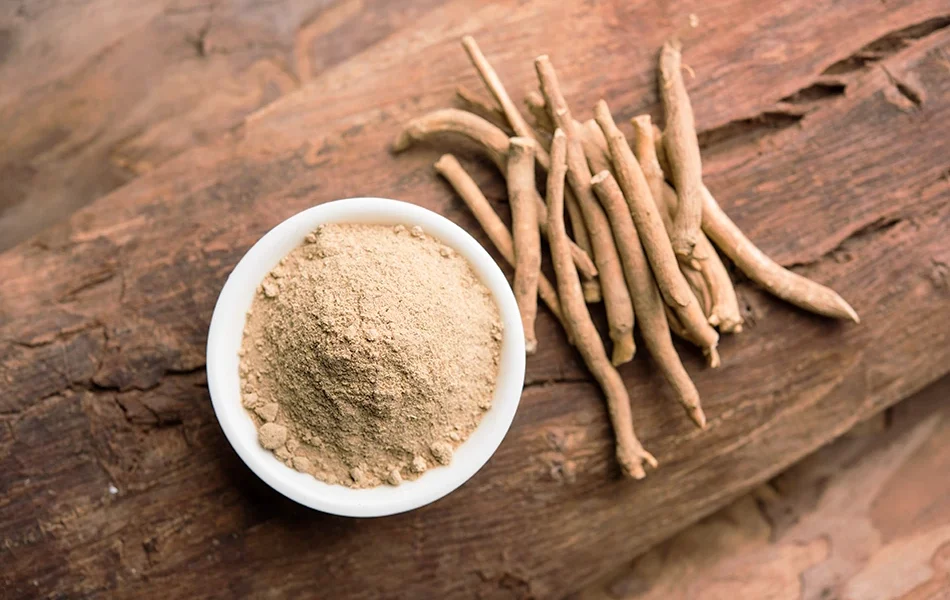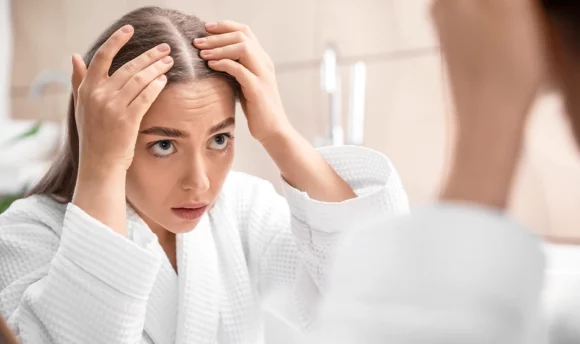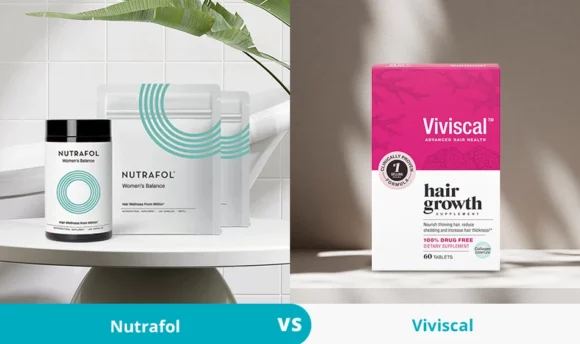Ashwagandha for Hair Loss: Does This Plant Have Hair-Boosting Powers?
This ancient herb has medicinal properties to support healing in the body. Some of these properties may support healthy hair and possible hair growth. Keep reading as this article discusses the relationship between ashwagandha and hair loss.

Ashwagandha (or Withania somnifera) is an evergreen shrub native to Asia and Africa. Some also know the plant as Indian ginseng and Indian winter cherry. It is considered an important medicinal herb in Ayurvedic medicine due to its potential healing powers.
As many people face hair loss due to age, genetics, hormonal imbalances, and more, there is always a need for new treatments. Thanks to its unique properties, ashwagandha might have a role to play in treating or preventing the condition.
Let’s see if ashwagandha can help to treat hair loss and whether it might benefit overall hair health.
Ashwagandha and Hair Loss: Can It Benefit Your Hair?
Ashwagandha boasts qualities that may reduce and prevent hair loss. It has anti-inflammatory properties that help reduce scalp irritation – a common culprit for hair follicle damage and possible hair loss. Improving your scalp health ensures a positive environment for hair to grow.
In a study, there was a noticeable reduction in scalp hair loss after 6 months of treatment with ashwagandha. It could also help to strengthen your hair follicles, which is important because healthy hair follicles are imperative to healthy hair growth.
Ashwagandha might be particularly beneficial for stress-induced hair loss because it is a well-known stress reliever. As chronic stress is often associated with hair loss, taking ashwagandha might help to conquer the problem.
High concentrations of ashwagandha root extract can improve a person’s resistance to stress, thereby reducing stress levels and improving quality of life. In fact, ashwagandha supplements are best known for their anti-anxiety and stress-reducing effects. They work by reducing cortisol levels, the body’s stress hormone.
Despite its natural mood-boosting properties, ashwagandha may cause hair loss in some people. It can increase testosterone levels, some of which convert to the hormone dihydrotestosterone (DHT). Higher levels of DHT activity are partly responsible for androgenic alopecia.
5 Ashwagandha Benefits for Hair
As well as working as a potential hair loss treatment, there are several more benefits of ashwagandha for hair. These additional perks that boost your overall hair health can further contribute to eradicating hair shedding and hair loss.
Here are five more reasons to try ashwagandha.
#1 Promotes hair growth
Ashwagandha might promote hair growth by increasing levels of the dehydroepiandrosterone (DHEA) hormone, an essential hormone for hair growth. This plant can also help nourish and strengthen the hair follicles to encourage hair to grow at a healthy rate.
Hormonal imbalances can affect your hair’s ability to grow. For example, the stress hormone cortisol can influence the function and cycle of the hair follicles. It can extend the resting phase in the hair cycle, making your hair grow slower than usual.
#2 Conditions hair
Hair nourishment is vital for healthy and shiny hair. Ashwagandha can work to condition the hair because it is full of antioxidants to improve scalp condition and reduce hair shedding. It contains amino acids which provide moisture and strength, preventing dry and brittle hair.
#3 Fights dandruff
A dry or irritated scalp sometimes triggers dandruff. As ashwagandha root exerts anti-inflammatory results, it can help to alleviate scalp irritation. These properties may provide relief for skin conditions that contribute to dandruff, such as eczema and scalp psoriasis.
#4 Improves blood circulation
Ashwagandha can improve blood circulation by relaxing the blood vessels. Improving blood flow and scalp circulation allows a healthy supply of blood and essential nutrients to reach the hair follicle. Your follicles might become stronger with a consistent stream of good nutrition.
#5 Reduces hair fall
The benefits above help keep hair in healthy condition, therefore mitigating hair fall caused by stress and poor scalp health. You can expect to grow a healthy head of hair once you manage to control hair fall and shedding.
How to Use Ashwagandha to Stop Hair Loss?
You can ingest ashwagandha or apply it topically to your scalp and hair. There are a few ways to do this, so you can look for the most suitable option for your lifestyle.
Below, you can find how to use ashwagandha as a hair aid.
Topical application
The topical method means you’re creating a physical ashwagandha hair loss treatment. Simply combine a couple of teaspoons of ashwagandha powder with water to make a paste. The paste should be runny enough to allow easy application as you spread it through your scalp and hair.
You can perform a gentle scalp massage as you go to stimulate blood circulation. People usually leave the paste for about half an hour before rinsing the hair thoroughly.
Alternatively, you can add the ashwagandha powder to your regular shampoo or conditioner and use it each time you wash your hair. Just remember to leave it in for a little while. There is also the option to purchase ashwagandha hair loss products that contain the ingredient.
Oral consumption
Ashwagandha supplements can become part of your daily haircare routine with minimal effort. All you need to do is swallow a capsule, following the product label’s instructions.
Another way to consume Indian ginseng is by adding the powder to a beverage, such as water, tea, or coffee. Although, it does have an earthy, bitter taste that some people might dislike.
Ashwagandha Dosage for Hair Loss
The precise dosage for hair shedding and loss is unclear as studies are lacking. However, there are some general recommendations you can follow, but you should always discuss the use of ashwagandha with your doctor before use.
2–3 spoonfuls of powder mixed with water should be sufficient when creating ashwagandha hair masks. It makes a smooth paste without being overly runny or thick.
To reduce stress levels, doses of 240 milligrams daily have proven effective. In other studies, 600 milligrams per day lowered cortisol levels.
What Is the Most Effective Way to Use Ashwagandha for Hair Loss?
You can use ashwagandha for hair loss topically or orally. As there is no substantial evidence to confirm ashwagandha as a hair loss treatment, it’s tricky to say which route is the most effective. It’s worth choosing the most appropriate method to maintain consistency.
For many people, taking ashwagandha via oral supplements is more straightforward than creating a mixture to apply topically. You can consume ashwagandha powder, capsules, or liquid extract in the correct doses.
FAQs
In some cases, ashwagandha may initiate hair loss by increasing dihydrotestosterone (DHT) hormone levels. On the other hand, this medicinal herb can prevent hair loss by reducing inflammation, lowering levels of stress hormones, and improving the condition of the scalp.
Ashwagandha has potent antioxidant and anti-inflammatory effects that may encourage healthy hair growth and assist with hair regrowth. It helps keep your scalp in good health to ensure proper functionality of the hair follicles responsible for your hair growth cycle.
Yes, ashwagandha can increase testosterone levels and therefore increase DHT levels in the body. Increased DHT activity can result in hair loss, including androgenic alopecia, also known as male pattern baldness.
A Word From an MD
Ashwagandha is gaining popularity, primarily for its ability to help the body cope with stress. Improving your mood can have positive effects all-round, including on your hair. Many hair supplements contain ashwagandha to boost health and prevent problems like hair loss.
While ashwagandha has a bunch of benefits, you shouldn’t rely on it alone. A mindful haircare regimen will help fight hair loss and boost growth. Eating enough protein, taking vitamins, using hair oil, and caring for your scalp are basic ways to keep hair in a better state.
You should seek professional medical advice if you are losing hair without an explanation. It could be the result of an underlying condition that requires treatment. Speaking with your doctor before using ashwagandha supplements is vital, as it may interfere with some medications.
Conclusion
A handful of claims support the use of ashwagandha for hair loss. This is mainly on the basis that ashwagandha reduces stress and anxiety – two hair loss precursors. It also possesses rich antioxidant properties to boost your hair’s overall health and anti-inflammatory properties to keep your scalp happy.

















































 Select your language:
Select your language: 








